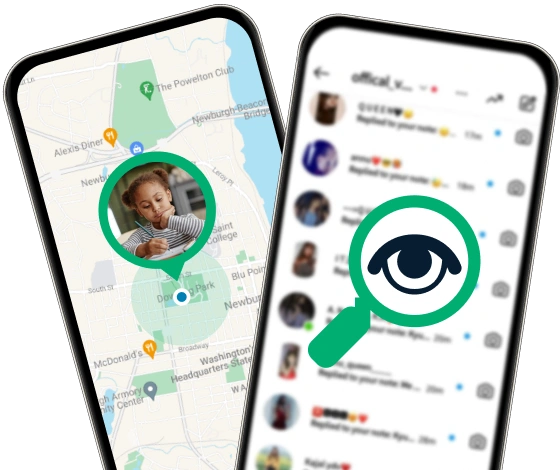Cyberbullying happens when a person is expressing falsified publications, uncensored content, defaming SMS, or spam message via electronic channels of communication. Thus, parents must know how to stop cyberbullying. This may sometimes include threatening to publicize the nudity of a person’s image or recorded voice notes of informal communication to tarnish such individual personality.
Children can apply the following measures to curb cyber attacks:
Inform a steadfast elder of your cyber attack. Whenever you are confronted with a cyberattack as a juvenile, try and bring the notice to your elder relatives, teachers, religious leaders, or regulatory agency saddled with the responsibility of reprimanding such an act. This is a better way to resist the bully from perpetrating further havoc. Don’t assume that you can handle the situation yourself or that reporting will escalate the case and put you in more distress.
Students should inform their college management when attacked online. Teenagers should identify key personnel in the direction capable of addressing their bullying cyber experience. Irrespective of what the school modus operandi seems, its policy should inculcate safety as a priority. Parents can therefore address such at a PTA meeting in situations where no action is taken.
The hoodlum should be broadcasted across social networks channels. Each social network platform has stated terms of engagement that are assumed every active member has read through before signing up on the forum. There are columns where defaulting members can be reported for intruding on another’s privacy, and corrective measures would be meted out on the defaulting individual, ranging from either suspension of their account or permanent termination of such statement.
Liaise with crime fighters on alarming bullying contexts. A cyberattack is a crime that extends beyond what parents or teachers can handle alone. It transcends beyond a society into a global menace. It, therefore, implies that law enforcement officers can be invited to the situation when it escalates beyond what the primary institution of learning could treat.
What Is Cyberbullying
Bullying refers to an oppressive attitude between two or more persons due to cruelly exercising power.
Cyberbullying centers around writing texts and speech that have the propensity to defame an individual’s character, publishing unverified info, and spreading words capable of making a tribe, values, culture, language, or beliefs seem superior to another via internet-enabled mediums.
Cyberbullying on social media occurs when teenagers’ freedom is threatened upon leveraging the internet. Therefore, it is essential to teach your children the signs of cyberbullying and suggest cyberbullying solutions.
Identifying Signs of Cyberbullying
Bullying can reduce an individual’s self-esteem to the barest minimum and make such feel like a minority when they are expected to make significant contributions that would benefit the populace.
Parents are expected to be on the lookout for the child’s fluctuation in academic performance, as this might indicate that things are not positioned the way they should be.
Discovering cyberbullying is more accessible if parents can take the time to understand the way their child reacts to situations. Below are suggested practices that can be adopted in identifying online bullying:
- Pay attention to grim expressions: receiving some intimidating or non-compliant information can be a way to be suspicious of cyberbullying.
- Be watchful of publicly abashed pointers: cyber intimidators devise various means of attacking the public. They spread rumors, grapevines, and unverified info.
- Be wary of cyber imposture representation: online bullying occurs when the oppressor takes actions that defame an individual’s personality. In some cases, you will discover that the perpetrator might create a facade with an existing screen name to solicit financial help or send tarnishing content against the target’s approval.
Taking Actions to Stop Cyberbullying
Charity, they say, begins at home; it implies that parents are saddled with the foundational responsibilities to curb bullying before expecting other institutions of learning to play their respective roles. Thus, if you wish to know the tips on how to stop cyberbullying, start from your home.
Make time to have a heart-to-heart discussion with your children regarding the advantages of adopting the internet and the inherent risks they might encounter, which cuts across avoiding websites and downloading apps capable of exposing the kids to annoying, violent, and disturbing ads. There should also be an agreed duration to be spent on the web, censored publications to be consumed, and they shouldn’t engage in posts that have bullying scenarios posed towards them.
Teenagers are somewhat expected to keep a record, possibly a screenshot, of the displeasing contents, which can serve as evidence while reporting such posts to the relevant authorities to take necessary actions to prevent further scenarios.
Preventing Cyberbullying
Now that you know how to stop online bullying, you should know how to prevent cyberbullying. Hence, among the several means of preventing online trolling are:
- Abstaining from uploading classified records on the web: most data used by bullies against their targets are mostly culled from the archives. Of what the individual has tweeted or uploaded at a point in time. Sharing should restrict confidential information on the internet to content that could be used publicly.
- Shunning engagement in cyberbullying actions: having low self-esteem or feeling defamed is not enough premise to make an individual conclude that someone else has to share their distress experience. This kind of thought portrays one as a sinister figure. Try as much as possible to discourage people from participating in these acts.
- Adopting parental control software usage: ensure installation and activation of the parental control app on your gadgets, as it can restrict your kids’ access to inappropriate or uncensored contents. Moving some apps under privacy lock is an additional idea that can be utilized.
Parental Tips to Help Stop Cyberbullying
The following tips can further answer the question “How to stop cyberbullying?” and measures through which parents can stop cyberbullying:
- Educate your children and initiate communications with them periodically on web platform contents.
- Create an easily monitored study room where you can keep the desktop and its components.
- Create impressions that can make your wards confide in you.
- Persuade your kids to avoid communication with a potential cyberbullying feed.
- In a situation where bullying arises, don’t push the blame on the victim, and at the same time, assure them that you will help them escape the probable occurrence.
- A law enforcement officer might come in handy when there are physical threats or assaults.
- Children are encouraged to report any cyberbullying case as soon as possible.
- By all means, do not take with leniency any form of a bully.
- A parent should be able to dictate which or which not social network the child is meant to visit.
Internet Safety for Kids: Parental Controls
Parents have to be on the lookout for what their kids do online. An excellent way to do that is by installing a phone tracking app like uMobix on a child’s device. It is also essential to go through your kids’ profile and chat sections to see who they speak with and what is under discussion. Although this might be an infringement of their privacy, it helps identify whether they’re cyberbullied quickly.
For instance, the uMobix app, a mobile phone tracker, reported that 36.5% of kids had experienced cyberbullying at one point in time or the other. In addition, the minors had come across racist speech, dictatorial threats, or demotivating speech but couldn’t report it for various reasons. Hence, uMobix has emerged to help parents monitor their wards’ activities while online.
The Bottom Line
We are in a digital age, and the rate of kids’ development and exposure is higher than ever. Thus, they’re prone to bullying outside their premises. Therefore, parents need to create an avenue for their wards to rub minds and share thoughts and experiences. The problem starts when kids start confiding in external parties rather than an immediate family who is meant to stand as a cornerstone.
FAQ
An easy path to discover when a child is experiencing online bullying is to read the teenager's mood, mostly when they are active online going through messages, blogs, articles, tweets, and topics circulated. Defaming or brutal content tends to create a turn-off in the reader's mood from consuming the entirety of the article.
Cyberbullying affects the mental health of children negatively. It can make a child lose interest in significant activities and start contemplating how people will treat them after hearing of their horrible experience. This afterward results in declining wellbeing.
The effect could be traumatizing and makes the youngster consider any honest thoughts as the most suitable approach to adopt to get out of the predicament they find themselves in.
The support team of the web channel should contact and forward evidence of such harassment so they can take timely and necessary action against such individuals. If it's a more complicated bully, report to the appropriate law enforcement agency.
There is a punishment for cyberbullying, and the severity of the sentence depends on the severity of the cyberbully. For example, you can block the person from participating on the social media platform. According to the law, the bully can be arrested and prosecuted in a more difficult situation.

Latest posts
- 10 Best Apps for Parents to Monitor Social Media: 2026 Guide
- Complete List of Keywords to Block for Parental Control
- Does Telegram Notify Screenshots? Everything About Screenshot Detection
- How to Find Someone’s Deleted Instagram Posts: Complete Guide
- Family Tracking App by uMobix: Keep Loved Ones Safe




